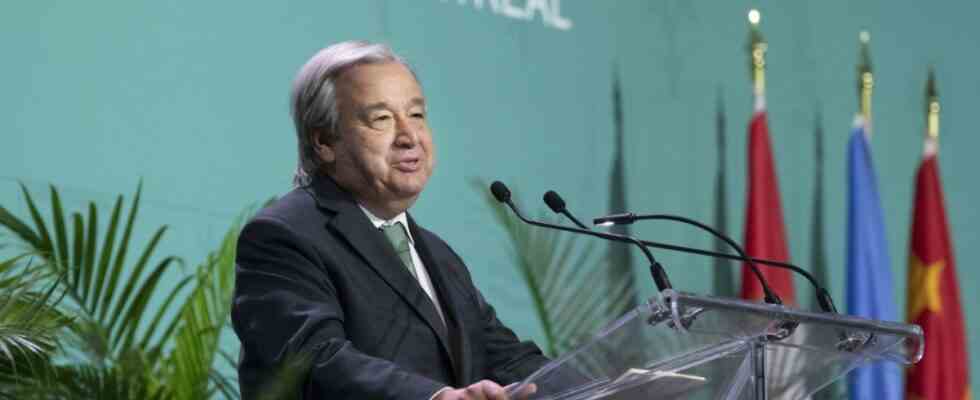UN Secretary General Antonio Guterres has called on the international community to adopt a strong agreement to protect nature worldwide, despite numerous resistance. A “peace pact with nature” must be concluded in Montréal, putting an end to centuries of environmental destruction, Guterres said at the opening of the UN biodiversity summit COP15 on Tuesday evening in the Canadian metropolis. “We treat nature like a toilet and in doing so commit suicide,” he said, referring to the destruction of human livelihoods.
Guterres received a lot of applause for his speech – but the eloquent UN chief was unable to give momentum to the actual negotiations between the almost 200 contracting states. They are entering their decisive phase with a clear setback: Even in a three-day emergency meeting, the negotiators were unable to agree on a draft for the agreement in good time at the beginning of the conference. A rapprochement, at least on some key points, had been mentioned in advance by all sides as a prerequisite for making the conference a success over the course of the next two weeks.
controversy on all points
According to participants, even after the special session, all major issues remain controversial. Brazil and Argentina, which are heavily dependent on agricultural exports, therefore refused any concessions with regard to the designation of large-scale protected areas and restrictions on agriculture. Iceland has blocked progress towards more sustainable fisheries. Questions about the future use of pesticides also remained controversial. Financial issues continued to be particularly hotly contested.
According to participants, there was also resistance to stipulations intended to ensure that agreed goals are actually implemented. The creation of control mechanisms and concrete indicators of progress is seen as a key lesson learned from the failure of previous agreements. Federal Environment Minister Steffi Lemke also emphasized that agreeing on clear provisions for the implementation and monitoring of the agreement for the federal government and the EU is a priority in the negotiations.
“We have not succeeded in significantly reducing the number of brackets,” admitted an EU diplomat familiar with the negotiations, alluding to the negotiating practice of marking disputed passages with brackets. “That puts us in a difficult position.” Progress can only be expected when more than 100 environment ministers get involved in the negotiations at the end of next week.
“After this result, success has become less likely,” believes Yves Zinngrebe from the Helmholtz Center for Environmental Research (UFZ). “The attempt to reduce the points of contention to a manageable level and to the essential politically critical aspects has failed.” Hardly anyone could imagine that against this background there could be a quick agreement on a sufficiently sharp agreement.
“We need an ambitious, realistic and feasible agreement.”
The politicians responsible were also alarmed. “There are many differences of opinion between governments,” admitted Canadian Prime Minister Justin Trudeau, who hosted the conference. Even China’s Environment Minister Huang Runqiu addressed problems as president of the negotiations. “There are difficulties,” he said. Specifically, he mentioned the open financing questions and the question of how high the goal should be set in a kind of preamble.
In order to bring the negotiations to a successful conclusion in the next two weeks, the head of the UN Convention on Biological Diversity, Elizabeth Mrema, demanded concessions from all states. “We need compromises on all goals,” she said. No country should block the conclusion of an agreement because it cannot achieve all of its own goals. “We need an ambitious, realistic and feasible agreement that does justice to the claim to stop the extinction of species.”

